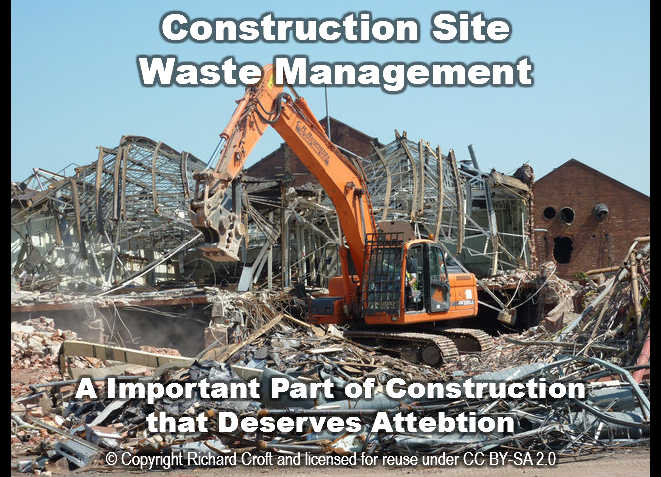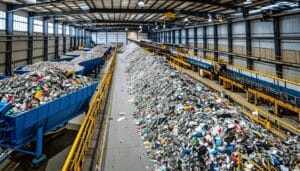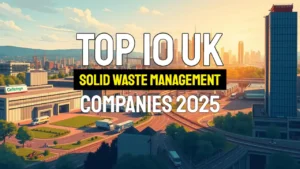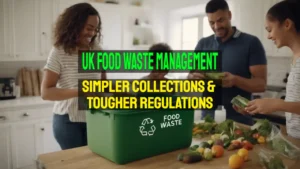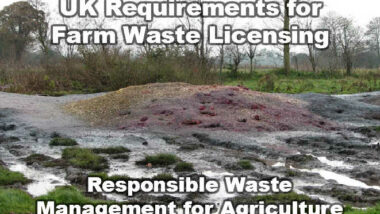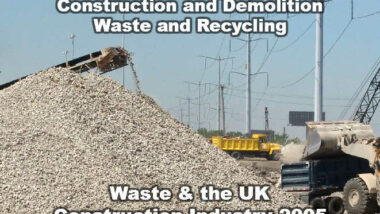In this article we explain why good Construction Site Waste Management is very important. Including the preparation of a Construction Site Waste Management Plan (SWMP) before site-works start
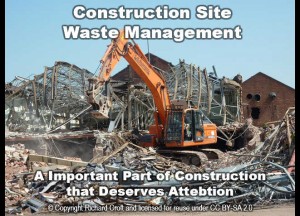
You might assume that waste is everything we don't want any more.
However the trash created on construction sites can be valuable as a raw material to build the next building on that site.
If demolition waste is recycled on-site, the waste produced is considerably reduced, if construction contractors know how to reuse or recycle it.
What's more the quantity of waste generated during construction, which a construction contractor needs to deal with, can itself be reduced by meticulous storage, moving and handling of materials.
To formulate a Construction Site Waste Management Plan (SWMP) before site-works start is the way to reduce waste, and save money. SWMPs are no longer legally required for all United Kingdom construction projects above a certain size.
But, the rate of recycling for demolition waste has now risen to 90%, without the legal requirement. The reason that recycling rates have risen so remarkably high is that SWMPs just plain work!
Handling demolition waste without pre-planning will waste time, money and effort also reducing a contractor's profitability.
To promote SWMPs , we made a video, which we have included below. It is partly out of date – The regulations requiring SWMPs were repealed years ago but the training in the steps provided, is as relevant as it ever was:
Site Waste Management Plans in Easy Steps
It takes time and costs cash to re-handle trash that was not managed properly at first.
It costs money to purchase the supplies in the first place, to lay up the rubbish on site, to move it from site, and to dispose of it. Landfilling charges are expensive. Waste disposed to landfill is subject to landfill tax in the UK which (in 2019) amounts to about £ 100/ tonne at the gate of a municipal waste landfill site.
Supplies like waste soil and waste clay may sometimes be sold to the landfill operator to make use of as daily cover, but deals of that sort are now rare.
There are often two bands of landfill tax:
- Active waste – which is subject to a higher rate above the rate for
- inactive garbage.
If these are mixed as one the upper price of tax will be charged on the full load, but segregating rubbish saves money if the inert demolition waste is crushed graded, and used as a raw material.
The principal concept of Integrated Sustainable Rubbish Management (ISWM) has been developed out of familiarity, to reduce certain common problems with municipal waste management globally. The problems are most acute in low-and middle-income countries in the South, and also in countries in transition.
The International Solid Waste Association (ISWA) recognizes three principal features in waste management:
(1) stakeholders,
(2) waste scheme elements and
(3) sustainability aspects.
The waste management hierarchy a policy guideline that is part of many countrywide environmental laws and policies is also a basis of the ISWM approach. The crucial objectives of the strategy/ trash hierarchy are to reduce the amount of waste produced, to intensify the quantity of waste recycled and to limit the menace of water pollution from waste.
What is Waste Anyway?
The term waste has a distinct consequence from one person to the next. As a rule it can be said would say that waste is not needed for the person who throws it out.
It's a product or substance that does not comprise a value to any further extent for the leading consumer and is as a result thrown away.
However, whether a material is redundant is subjective. Moreover, the waste may perhaps hold worth for another person in a different situation. Or it may similarly be seen as having value in society other than the one in which it was created.
There are numerous large companies that operate first and foremost or exclusively, by means of recycling trash materials. Paper and metals are the commonest as their industrial feed stocks.
The money-making improvement of a state can set off an intensification in pressures on its location and increases the need for a decline in environmentally detrimental actions.
A common denominator particular to these negative actions, will very often have to do with the creation and disposal of trash.
Construction Site Waste Management Policy
Founded upon the UK policy document ‘Making Waste Work' published during 1995, the Waste Strategy 2000 for England and Wales describes the policies regarding the recovery and disposal of waste. These policies are a constraint of all countries participating in the European Union (EU).
The way to accomplish much better, sustainable development is concerned with achieving profitable growth, in the form of elevated living standards. It is absolutely not about hair shirts and scrimping and economy, or punishing ourselves for enjoying the use of the planet's capital right now.
One of the most critical areas for society to act sustainably is in how it throws away its waste, its junk and debris.
Nothing else, other than fossil fuel energy over-use causing climate change, and war, has the potential to do so much accumulating damage.
Revolutionizing Waste Recovery: Latest Separation And Sorting Innovations
Waste recovery is changing fast, thanks to new separation and sorting technology. This tech helps us sort trash better, so we can recycle more things. For example, Stadler has built a big plant in Spain for VAERSA that makes recycling easier and smarter. Keson is finding new ways to deal with old tyres, helping both […]
Top 10 UK Solid Waste Management Companies 2025
The UK waste management sector stands as a vital industry worth billions of pounds. The top UK Solid Waste Management Companies are the leading waste management firms in Britain. These companies handle millions of tonnes of rubbish each year. The industry has transformed significantly over the past two decades through strategic mergers and environmental innovations. […]
Ramp Method of Waste Disposal – Landfill Guide & Techniques
The ramp method optimizes landfill operations by creating an inclined surface, allowing efficient waste compaction and daily cover application. Unlike traditional methods, it requires minimal excavation, reducing costs and extending landfill lifespan. Proper implementation and equipment maintenance are key to effective ramp method performance in various terrains…
The Future of UK Food Waste Management – Simpler Collections and Tougher Regulation
The future of UK food waste management will be a big push toward higher recycling rates through simpler collection and far greater consistency across the nations, helping citizens understand how to be green and recycle more organic waste. As the UK continues to advance its environmental goals, recently announced government policies aimed at simplifying waste […]
